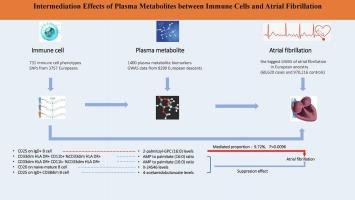Genetically predicted plasma metabolites mediate the causal role of immune cells in atrial fibrillation
IF 3.7
3区 医学
Q2 BIOCHEMISTRY & MOLECULAR BIOLOGY
引用次数: 0
Abstract
Objective
Determining and measuring the possible mediating function of plasma metabolites in the causative link between immunophenotype and atrial fibrillation (AF).
Methods
A bi-directional two-sample Mendelian randomization (MR) analysis of 731 immune cell phenotypes and atrial fibrillation was conducted using summary-level data from a genome-wide association study (GWAS). Subsequent investigations centered on examining 1400 plasma metabolites for potential mediating roles in immune cell-induced atrial fibrillation using two-step MR.
Results
After screening 29 immune cells linked to AF risk, this study found that 15 of them were linked to an increased risk of AF and 14 to a lower risk. Furthermore, a possible causal link between 22 plasma metabolites and atrial fibrillation was found. Five immune cell-metabolite matches were ultimately shown to have mediating functions in the pathology of atrial fibrillation. Of the five final sets of data, one group showed a partial mediation effect, two metabolites and one metabolite ratio showed suppression effects of moderating the process of immune cell-caused atrial fibrillation.
Conclusion
The results point to a potential major role for immune cells and plasma metabolites in the initiation and progression of AF. For the purpose of preventing and treating AF, these findings could offer novel biomarkers or therapeutic targets in the unclarified pathogenesis of atrial fibrillation, particularly for immune-related pathways.

基因预测血浆代谢物介导免疫细胞在房颤中的因果作用。
目的:确定和测量血浆代谢物在免疫表型与房颤(AF)致病关系中的可能介导作用。方法:利用全基因组关联研究(GWAS)的汇总数据,对731种免疫细胞表型和房颤进行双向双样本孟德尔随机化(MR)分析。随后的研究集中于使用两步mr检查1400种血浆代谢物在免疫细胞诱导的房颤中的潜在介导作用。结果:在筛选了29个与房颤风险相关的免疫细胞后,本研究发现其中15个与房颤风险增加有关,14个与房颤风险降低有关。此外,发现22种血浆代谢物与房颤之间可能存在因果关系。五种免疫细胞代谢物匹配最终显示在房颤病理中具有介导功能。在最终的五组数据中,一组显示部分中介作用,两组代谢物和一组代谢物比例显示调节免疫细胞引起的房颤过程的抑制作用。结论:这些结果表明免疫细胞和血浆代谢物在房颤的发生和发展中可能起着重要作用。为了预防和治疗房颤,这些发现可能为房颤未明确的发病机制,特别是免疫相关途径提供新的生物标志物或治疗靶点。
本文章由计算机程序翻译,如有差异,请以英文原文为准。
求助全文
约1分钟内获得全文
求助全文
来源期刊

Cytokine
医学-免疫学
CiteScore
7.60
自引率
2.60%
发文量
262
审稿时长
48 days
期刊介绍:
The journal Cytokine has an open access mirror journal Cytokine: X, sharing the same aims and scope, editorial team, submission system and rigorous peer review.
* Devoted exclusively to the study of the molecular biology, genetics, biochemistry, immunology, genome-wide association studies, pathobiology, diagnostic and clinical applications of all known interleukins, hematopoietic factors, growth factors, cytotoxins, interferons, new cytokines, and chemokines, Cytokine provides comprehensive coverage of cytokines and their mechanisms of actions, 12 times a year by publishing original high quality refereed scientific papers from prominent investigators in both the academic and industrial sectors.
We will publish 3 major types of manuscripts:
1) Original manuscripts describing research results.
2) Basic and clinical reviews describing cytokine actions and regulation.
3) Short commentaries/perspectives on recently published aspects of cytokines, pathogenesis and clinical results.
 求助内容:
求助内容: 应助结果提醒方式:
应助结果提醒方式:


